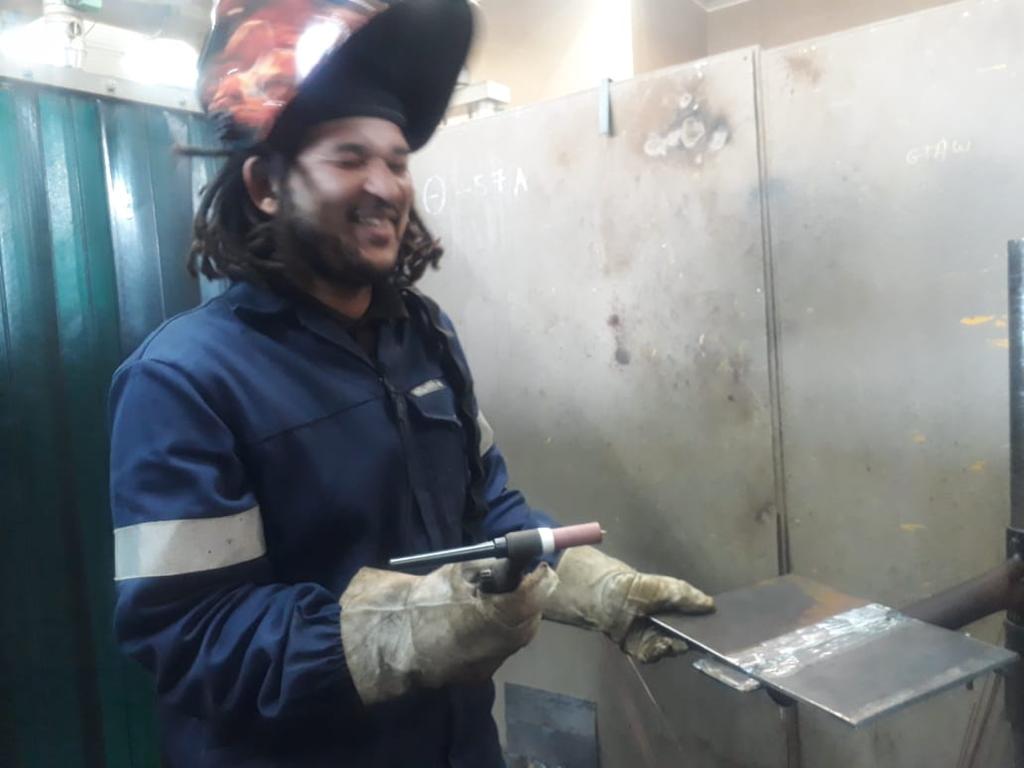
Hard won experience has taught student Misha Geidt that globally recognised welding qualifications provide an open-access passport to the world of welding opportunities. He is therefore forging ahead by studying for an International Institute of Welding qualification that will allow him to compete for jobs on the international stage.
Misha, like most school leavers, found entering the world of full-time employment both challenging and a little daunting. While he had completed a local welding certificate in South Africa, he discovered he didn’t have the skills required for high-level welding jobs in Australia where he hoped to live and work.
“If I only knew then what I now know, I could have been further down the road in my career,” says Capetonian-born Misha. “When I first travelled to Australia looking for a job, my training proved inadequate. I thought I could weld before but having embarked on the SAIW’s international qualification programme, I am finding that the standard is so much higher than the previous training facility I attended, and the courses are far better planned out. It has been strenuous, but I’m loving the attention to detail that is provided and the chance to improve my practice of welding to be more precise, consistent and to such a high standard.”
According to SAIW Market Development Manager Etienne Nell, Misha’s previous welding skills have allowed him to fast track his training trajectory on the 28-week IIW International Welder programme, which he commenced relevant to his skills level in March 2021.
“The first question I always like to challenge students with is ‘what can happen if a weld fails?’,” says Nell. “The answer, of course, is that people are going to die, whether it is a gate that is welded inadequately and falls on a person, or a power station boiler, a skyscraper or an oil pipeline with a defect or incorrect valve.
“At the SAIW we, therefore, don’t only apply visual testing to a student’s training welds. Instead, we test each weld in our lab to exact specifications which are key to ensure the relevant standards are maintained as a welder holds enormous responsibility towards structural standards and ultimately lives.
“This is backed up by the industry welding codes which tell us when fabricating something, the mandate of responsibility lies with the contracted fabricator to ensure that the people employed by them are competent to avoid putting lives and structures at risk, especially when working welds in high pressures or extreme temperatures. When this young man leaves the IIW programme here in South Africa, he can choose to weld anywhere in the world.”
For Misha, being able to measure his progression at the end of each day allows him to quantify his efforts of achieving the small goals which lead to completing part of a bigger project down the road. “I find the programme so rewarding, I like the chance to be able to say ‘I did this, its practical application is so gratifying.”
While attending the programme in Johannesburg, Misha has been staying in a local guesthouse, catching an Uber to the SAIW and then walking the return journey home, “It’s only an hours’ walk but I see it as a good opportunity to get fit and clear my head as well; walking helps to massage my brain!”
On completing the IIW International Welder programme, Misha plans to look for a job in Johannesburg first and then alternatively, return to Cape Town and continue the search either at the Cape Town Waterfront harbour, the Simonstown naval docks, Koeberg Nuclear Power Plant or the Cape’s oil refineries to gain further work experience.


